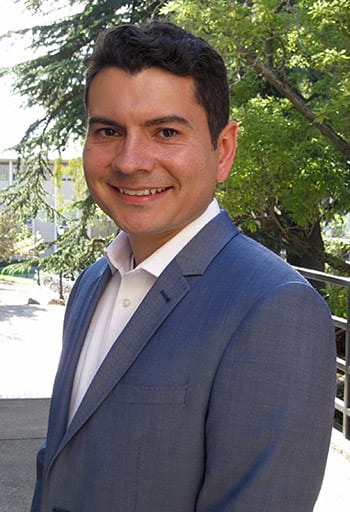By Andrew Cohen

Fueled by the injustice he encountered as a student advocate, Phil Hernandez ’16 has turned a simple idea into a California bill to protect tenants involved in eviction lawsuits.
While working with the Housing Program at the East Bay Community Law Center (EBCLC), Hernandez assisted clients who suffered from what he calls “a big flaw in landlord-tenant law.” Under existing rules, a tenant must win an eviction suit within 60 days—or else the court records become public and end up on the tenant’s credit report.
“Problem is, cases regularly get resolved after 60 days,” Hernandez said. “Even if the tenant wins or settles the case, or gets the case dismissed on day 61 or later, that tenant suffers a damaged credit score for seven years. Innocent tenants and their families may also be placed on ‘tenant blacklists.’ The result is that it can become nearly impossible for them to find safe and affordable housing, which exacerbates homelessness.”
Eviction lawsuits are supposed to be heard within 20 days of filing. But severe budget cuts and court closures following the 2008 economic downturn has led to statewide delays. Current law punishes tens of thousands of innocent tenants in California each year, Hernandez said, including those who never received notice of the eviction lawsuit.
His bill—AB 2819—would ensure that all tenant records remain private unless landlords prevail within 60 days of filing suit.
“The first thing housing attorneys ask when they take a new case is, “When’s day 60?’” said Hernandez, who came to Berkeley Law after working in the White House as a senior policy analyst in energy and climate change. “Whether a tenant wins on day 59 or day 61 shouldn’t impact his or her life so dramatically. We’re not proposing a major, substantive change to landlord-tenant policy. It’s a common-sense adjustment that California badly needs.”
From student assignment to Sacramento
Hernandez tackled the topic last year in a paper for his Consumer Protection Law course, taught by lecturer Ted Mermin ’96, co-founder of the Public Good Law Center. In documenting the problem and prescribing a policy solution, Hernandez proposed tweaking the law to prevent court records from being released without a valid and final court judgment against the tenant.
Intrigued by the content, Mermin encouraged Hernandez to pursue making it a reality. Mermin provided background information on the California State Legislature, helped find sponsors for the proposed legislation, and worked with Hernandez on the bill’s language and amendments in response to input from various stakeholders.
“Phil is as capable and self-sufficient as they come,” Mermin said. “He did the lion’s share of the work on this bill and developed a great webpage about it. I’m always inclined to introduce him as my colleague rather than my student.”
Soon after two advocacy groups, the Western Center on Law & Poverty and California Rural Legal Assistance, agreed to co-sponsor the bill, Hernandez and Mermin went to Sacramento in January and discussed it with various legislators. State Assemblymember David Chiu agreed to author the bill in February.
Later this month, the Assembly’s Judiciary Committee will conduct a hearing on the proposed legislation. After the committee votes, the bill will move to the full assembly and then, if successful, to the state senate.
“Phil’s initiative and commitment to making this bill happen have been very impressive,” Mermin said. “The other folks working on it always make sure to include him directly in any communication. I may be the guy with a bar number, but they know who’s the real engine behind this effort.”
Hernandez, who will join the San Francisco office of the plaintiff-side law firm Leiff Cabraser Heimann & Bernstein this fall, insists that the bill signals a team effort fueled largely by Mermin and EBCLC Housing Program Director Laura Lane.
“Ted and EBCLC’s housing attorneys are incredibly empowering,” Hernandez said. “They could have laughed at a student who wanted to draft a state bill. Instead, they encouraged me and helped me move this forward. Laura provided great insights and Mark Janowitz offered an alarming mastery of the California Civil Code. Sharon Djemal (now director of the Consumer Justice Clinic) helped guide our strategy early on, and Megan Gordon and Gracie Jones pointed me to clients who had been wronged. To pass a bill, you really need a community behind you, and there’s no better community than EBCLC.”